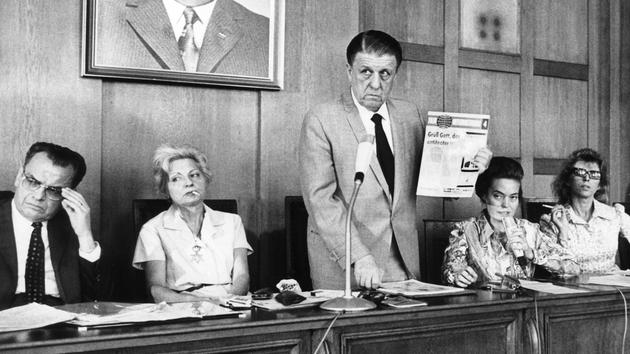Tainted by revelations about the Nazi past of its founder, the Berlinale, which ends on Saturday, has rubbed this year the challenges of memory, the Third Reich, racism in Brazil and decolonization. The 70th edition of the Berlin festival had not yet started as it faced the journey of Alfred Bauer, a high-ranking Nazi and father of the Berlinale.
Endowed with a new management, the Berlinale had to react, in particular by abolishing the "Alfred Bauer" prize given so far each year. The festival also commissioned the Institute for Contemporary History (IfZ) in Munich to investigate the reality of its founder's ties to the Adolf Hitler regime.
Read also: Launch of the 70th Berlinale, against a backdrop of controversy and tribute
" About Alfred Bauer, it is likely that some voices were raised at the time (about his links to Nazism), but that has been brought under the carpet and is not apparent until now, " said at AFP Andreas Wirsching, director of IfZ.
A duty of memory
The festival, while struggling with its own history, this year has offered several films that shake up entrenched performances. Like the supposed moderation of Nazi leader Albert Speer, one of the few who escaped capital punishment at the Nuremberg trials. In Speer Goes To Hollywood , Israeli director Vanessa Lapa deciphers the efforts of the Nazi architect to rewrite, in his Memoirs in particular, his own role. " Speer is a perfect example of how a Nazi can tell his own story as if he and those in his community had little to do with it, " said Wirsching.
Read also: Wave to the soul at the 70th Berlinale
Rewriting the past is also an issue in contemporary Brazil, according to director Marco Dutra, whose film All the Dead Ones is in the running for the Golden Bear. Far-right Brazilian President Jair Bolsonaro said that racism was " rare " in the country and did not hesitate to recently appoint the head of the Institute of Afro-Brazilian Culture Sergio Camargo, for whom l slavery had been " beneficial " to people of African descent.
Mr. Dutra takes an opposite view in All the Dead , a film set in Sao Paulo at the end of the 19th century, a decade after the abolition of slavery. “ Despite the many theories still going on claiming that Brazil is built on a mixture of identities, the reality is very different. It is a very racist country , ”he denounces.
Learn from the past
Another candidate for the Golden Bear, the Franco-Cambodian Rithy Panh, judges him that the cinema has a role to play in the " fight against totalitarianism ". His film, Irradiated , confronts the viewer with poignant images of Hiroshima and the Shoah. " In fact, the film is always a cry. A cry of hope or a cry to ward off misfortune because we think it is the last century, but things repeat themselves over and over again, ”he warns.
Nigerian director and archivist Didi Cheeka of the Lagos Film Society believes that cinema can help a society deal with its past. In the short film Memory Also Die , he unearths images of Nigeria, hitherto forgotten. The filmed archives can, he explains to AFP, make it possible to question the " official accounts " of the Biafra war, which divided Nigeria, just independent in the late 1960s.
Read also: An abortion, a child's death, a Stalinist trial ... The Berlinale likes to hurt itself
Because Nigerians have been encouraged for decades not to talk about the conflict, resentments are haunting the country, the most populous in Africa, he argues. By restoring images of the war from colonial archives, Mr. Cheeka wants to help " bridge the gap " between various regions of the country and allow " people to accept what happened ".

